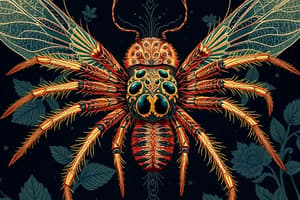Podcast
Questions and Answers
Why do bees engage in elaborate dance routines?
Why do bees engage in elaborate dance routines?
- To scare off predators
- To find food
- To mark their territory
- To communicate with each other (correct)
What is the primary purpose of butterflies' complex courtship rituals?
What is the primary purpose of butterflies' complex courtship rituals?
- To communicate with other species
- To establish dominance
- To defend their territory
- To attract a mate (correct)
How do insects contribute to maintaining ecological balance?
How do insects contribute to maintaining ecological balance?
- By causing imbalance in food chains
- By disrupting ecosystems
- By competing with other species
- By occupying a wide variety of ecological niches (correct)
What is one way insects contribute positively to human life, as mentioned in the text?
What is one way insects contribute positively to human life, as mentioned in the text?
Which kingdom do insects belong to?
Which kingdom do insects belong to?
What is a characteristic feature of insects based on the information provided?
What is a characteristic feature of insects based on the information provided?
How do insects contribute to pest control services in ecosystems?
How do insects contribute to pest control services in ecosystems?
Which of the following is NOT a type of insect diet mentioned in the text?
Which of the following is NOT a type of insect diet mentioned in the text?
What important role do insects play in ecosystems according to the text?
What important role do insects play in ecosystems according to the text?
How do some insects help in pollination?
How do some insects help in pollination?
What material makes up the exoskeleton of insects?
What material makes up the exoskeleton of insects?
Flashcards are hidden until you start studying
Study Notes
Kingdom Animalia
The animal kingdom is divided into five classes based on physical characteristics and evolutionary history. One of these classes is the class Insecta or Arthropoda, commonly known as insects. Insects are characterized by their segmented bodies, three pairs of legs, antennae, compound eyes, and wings in some groups. They also have exoskeletons made up of chitin, which is a type of polysaccharide.
There are more than 1 million known species of insects, and they play a crucial role in almost every ecosystem. Some common examples of insects include ants, termites, bees, wasps, sawflies, grasshoppers, crickets, etc.. Insects have evolved various adaptations like camouflage, mimicry, and symbiosis to survive in different environments.
Insects can be found everywhere from forests and fields to deserts, mountains, and aquatic habitats. There are many types of insect diets, including herbivores, carnivores, omnivores, and scavengers. Some insects even eat other insects, contributing to pest control services in our ecosystem.
Insects serve numerous functions within ecosystems. For instance, pollination of plants occurs primarily through the actions of insects. These animals help in recycling nutrients, controlling plant diseases, and serving as food sources for other creatures. However, some insects can cause harm, such as mosquitoes transmitting diseases or crop pests damaging agricultural production.
Morphological differences among insects allow them to perform diverse roles within their respective ecosystems. This diversity is reflected in their unique behaviors. For example, bees engage in social behavior with elaborate dance routines used to communicate, while butterflies exhibit complex courtship rituals involving colorful displays.
In conclusion, the class Insecta or Arthropoda within Kingdom Animalia represents a vast array of adaptive, multifunctional organisms. Their presence contributes significantly to maintaining ecological balance due to their wide variety of ecological niches and functional roles. Despite causing problems occasionally, they generally contribute positively to human life by providing pollination services, serving as natural pest control agents, and offering protein resources.
Studying That Suits You
Use AI to generate personalized quizzes and flashcards to suit your learning preferences.




